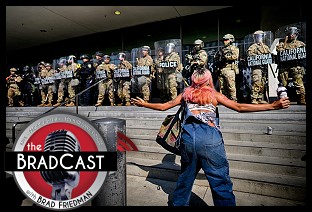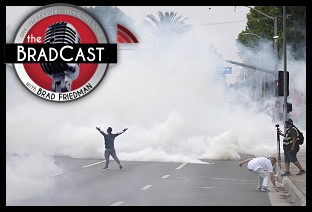 Even if it withstands Los Angeles County's appeal to the 9th Circuit, the well intended decision, handed down last month by veteran U.S. District Court Judge David O. Carter in a federal lawsuit filed by the LA Alliance for Human Rights, will, at best, ameliorate but not eliminate the nightmare of homelessness at the heart of a place that dares to call itself the City of Angels.
Even if it withstands Los Angeles County's appeal to the 9th Circuit, the well intended decision, handed down last month by veteran U.S. District Court Judge David O. Carter in a federal lawsuit filed by the LA Alliance for Human Rights, will, at best, ameliorate but not eliminate the nightmare of homelessness at the heart of a place that dares to call itself the City of Angels.
In support of legal grounds for federal court intervention, such as the Equal Protection Clause of the 14th Amendment, Judge Carter laid out, in compelling detail, the link between LA's deadly "crisis of homelessness" and "entrenched structural racism". The validity of that link was underscored by the fact that African-Americans account for only 8% of the general population in the County; yet they account for 42% of the now more than 66,000 unhoused residents.
Judge Carter's lengthy, 110-page decision contains a deep dive into a sordid history of systemic racism in Southern California and its disparate impact on people of color. This, in the Court's view, has given rise to what California Governor Gavin Newson, in his Feb. 19, 2020 State of the State Address, referred to as "the wrenching reality of families, children and seniors living unfed on a concrete bed." The Court condemned the City and County's deliberate decisions to perpetuate unspeakable squalor by attempting to physically contain it within a 50-square-block downtown Skid Row and by policing policies that criminalize homelessness.
The Court described the mishandling of funds intended to provide shelter as the product of "corruption" and "deliberate indifference" towards the unhoused, who suffer from rampant crime, drug addiction, mental illness and deaths caused by all manner of disease. In 2016, for example, LA voters passed a $1.2 billion bond measure that was supposed to create up to 10,000 homes. Over the ensuing four-years, the City erected only 489 housing units (apartments) at a median cost of $531,000 per unit --- units that have been disproportionately occupied by the unhoused who are white.
To rectify this, the Court, by way of a preliminary injunction, ordered an audit of all relief funds and the placement of $1 billion from Mayor Eric Garcetti's "Justice Budget" into an Escrow Account. Judge Carter appointed a Special Master to assist with the implementation of the Court's directives. Despite protestations that they lacked the necessary funds and an objective reality that one can't expect to extract blood from a stone, the Court also ordered the City and County to provide shelter to all unhoused residents within 180 days. (The preliminary injunction will not take effect prior to June 15 by reason of a temporary 9th Circuit administrative stay).
As we observed in 2019, the source of LA's homeless crisis lies not only in a legacy of systemic racism, but also in extreme inequality, which is tied to neoliberal capitalism. This entails a radical form of market fundamentalism, which has been at the center of U.S. economic policies since the Reagan administration.
LA's homelessness crisis will not end absent the federal government's adoption of what former U.S. Labor Secretary Robert Reich has described as "Bidenomics"...
SoCal and Jim Crow
 Looking back at the time I was attending public schools here in the 1950s and '60s, I recognize that I suffered from a form of racial naiveté.
Looking back at the time I was attending public schools here in the 1950s and '60s, I recognize that I suffered from a form of racial naiveté.
Like so many of my generation, I was appalled by the viciousness directed at peaceful African-American demonstrators by vile Southern racists like Eugene "Bull" Connor. I considered segregation to be an unacceptable condition that existed in the former Confederate States. I simply didn't appreciate the oddity that my Sherman Oaks neighborhood in bucolic Southern California and the public schools I attended in the San Fernando Valley region of Los Angeles were almost exclusively white.
That condition, as Judge Carter poignantly reveals, didn't occur by happenstance. In 1910, 36% of African-Americans, residing in racially diverse neighborhoods, were homeowners. That would drastically change as LA's African-American population grew by the tens of thousands [background links added]...
By the mid-20th century, even as these overt forms of racism waned, racial inequality was well-established and became self-perpetuating.
Using political clout, wealthy white neighborhoods, like Beverly Hills, evaded the disruption caused by eminent domain associated with freeway construction. "Non-white freeway evictees," the Court observed, "were forced to find housing in already condensed, segregated areas of South and East Los Angeles, away from job centers."
"Today," the Court observed, "the legacy of racially motivated freeway construction burdens Los Angeles communities of color not only economically but physically. Hazardous vehicle-related pollutants...are highly concentrated near major roadways, inducing respiratory ailments and mortality in high-traffic neighborhoods."
Segregation and inequality that arose from racist 20th century development policies, the Court observed, have continued via low density zoning in more affluent white neighborhoods [background links added]...
Policies to contain/perpetuate homelessness
Los Angeles, the Court observed, "was content with misery so long as it was unseen".
In the 1970s, the City adopted a "Blue Book" plan that was designed to "contain" unhoused people within a 50-square-block Skid Row. In addition to the psychological barriers contained in the plan, the Court noted that the LAPD "set up physical buffers to reduce movement past the Skid Row border...Flood lights demarcated the border, disincentivizing homeless from straying outside the border."
LA's Skid Row houses the nation's largest homeless population and its three most dangerous, crime-ridden neighborhoods. As we previously reported in 'Paradise Lost': At the Bottom of Wealth Disparity, (see ABC's Seattle affiliate KOMO News video below), even before COVID, Skid Row's unhoused were at risk of contracting all manner of deadly diseases, including tuberculosis, Bubonic Plague, aka "The Black Death, typhus and typhoid fever.
The unhoused are also eleven times more likely to be struck down and killed by a train or motor vehicle than those living elsewhere, the Court noted.
The Court condemned the City's and LAPD's "entrenched longstanding and systemic criminalization affecting Los Angeles' most vulnerable." In 2016, even as citywide arrests decreased by 15%, arrests of the unhoused rose by 31% as compared to 2011. "Two thirds of those arrested," the Court observed, quoting the LA Times, "were black and Latino, and the top five charges were for nonviolent or minor offenses."
Ticketing and arrests, the Court noted, create "a revolving door of debt and insecurity where a history of arrests bar individuals from housing and sustainable jobs."
'Corruption'
 Judge Carter excoriated the "disconnect" between County and City officials' public acknowledgement of "the severity of this crisis and the actual efforts to fund effective solutions."
Judge Carter excoriated the "disconnect" between County and City officials' public acknowledgement of "the severity of this crisis and the actual efforts to fund effective solutions."
The Court cited two cases where developers of taxpayer-funded affordable housing projects resold properties to themselves in order to inflate the original budget by $8 million and $6 million, respectively. Those cases, the Court observed, "indicate" the City "has turned a blind eye to corruption as money is being siphoned off funds that taxpayers voted to allocate to the homeless population"...
It appears that LA voters, 77% of whom approved Proposition HHH in 2016, may have been scammed. The measure was billed as a $1.2 billion bond initiative that was supposed to create 10,000 new housing units within 10 years. Yet, according to a recent press release issued by LA City Controller, Ron Galperin, the measure has led to the construction of just 489 units.
Let's be clear here. By "unit", Galperin is referring to one of the 489 apartments that were erected within just seven (7) total projects. These were built at a median cost of $531,000 per unit. The City Controller anticipates the cost will continue to rise. By contrast, "the average cost of a custom home in L.A.," the Court observed, "starts at $350,000."
The Prop HHH monies could have been far more efficiently utilized to provide immediate shelter, the Court asserted, but the City decided that all but 5% of its funds would be devoted to its overpriced, developer-enriching apartment projects.
Priorities
By contrasting LA's "deliberate indifference" and "inertia" with the the State's laudable and aggressive actions, the Court revealed that the ability to end homelessness within what Governor Newsom described as "the richest state in the [world's] richest nation", entails a matter of political will.
Acutely aware that the onset of COVID within the Golden State's homeless population, which had grown by 28.3% between 2018 and 2020, could lead to a humanitarian catastrophe, Newsom swiftly reacted. In a span of less than one year, California purchased and subsidized 6,029 housing units statewide at a cost of $846 million under Project Homekey. These expenditures were atop the $650 million in 2019 and an additional $150 million in 2020 that the Governor released to the cities in order to deal with the state's homelessness crisis. Those additional funds were a part of the FEMA reimbursable Project Roomkey --- a COVID relief program to convert unused hotel and motel rooms into temporary shelters.
LA's business and civic leaders appear to have shared the Governor's concern. In February 2021, as the Skid Row death rate rose to unprecedented levels, 500 of them urged the City to use Roomkey funds to secure 15,000 hotel rooms. However, in March, the City of Los Angeles, citing budgetary constraints, announced "it would ramp down Project Roomkey." A subsequent LA Times investigative report, the Court noted, revealed that the supposedly cash-strapped City had failed to request FEMA reimbursements for its previous Roomkey expenditures.
Beyond homelessness
 Nearly two years ago, we observed: "The root cause of homelessness is systemic: structural inequality. Ours is a system, which, as of 2012, permitted the world's super-rich to hoard $32 trillion in tax-evading offshore accounts." We also noted that, per a 2017 study, "just three individuals --- Bill Gates, Warren Buffet and Jeff Bezos --- had, at that point, held as much wealth as the bottom 50% of the American population --- some 160 million people."
Nearly two years ago, we observed: "The root cause of homelessness is systemic: structural inequality. Ours is a system, which, as of 2012, permitted the world's super-rich to hoard $32 trillion in tax-evading offshore accounts." We also noted that, per a 2017 study, "just three individuals --- Bill Gates, Warren Buffet and Jeff Bezos --- had, at that point, held as much wealth as the bottom 50% of the American population --- some 160 million people."
We predicted, based in part on the passage of the 2017 Donald Trump/GOP tax cuts --- cuts that amounted to Reagan's "trickle-down" neoliberal economics on steroids --- that inequality would expand, exponentially.
Enter COVID-19.
At the same time the world's 2,365 billionaires added $4 trillion to their already obscene accumulated wealth, and as the wealth of one man --- Jeff Bezos --- soared from $113 billion to $178 billion, 40 million Americans were confronted with the threat of being evicted --- a deadly threat that was recently enhanced when a Trump-appointed federal judge overturned a nationwide eviction moratorium. (The U.S. Dept. of Justice appealed. The Court then stayed the decision to overturn the moratorium).
Neither federal court oversight of LA's response to homelessness nor the significant monies the State and LA voters have provided for housing will be enough to eliminate this disgrace. Instead, the solution lies in what Brad Friedman and Heather Digby Parton described as the promise of an "end to the Reagan era" embodied in President Joe Biden's first address to a joint session of Congress, in the President's Green New Deal-like, $2.25 trillion American Jobs Plan and in his $1.8 trillion American Families Plan.
To end gaping inequality, we must recognize the need to prevent the perpetuation of a tiny class of billionaires. The enactment of a tax on extreme wealth would begin to tackle this concern, perhaps augmented by a return to the Eisenhower era top marginal tax rate (91%) --- at least as to incomes in excess of $10 million/year. Moreover, progressive tax policies must be enforced by an adequately funded IRS.
Only a genuinely egalitarian and enlightened society, committed to both political and economic equality, can permanently end the scourge of homelessness.
UPDATE, 9/24/21: On Sept. 21 the U.S. 9th Circuit Court of Appeal reversed Judge Carter's decision to grant a preliminary injunction.
KOMO News' "Paradise Lost" video report from 2019 follows below...
 Ernest A. Canning is a retired attorney, author, and Vietnam Veteran (4th Infantry, Central Highlands 1968). He previously served as a Senior Advisor to Veterans For Bernie. Canning has been a member of the California state bar since 1977. In addition to a juris doctor, he has received both undergraduate and graduate degrees in political science. Follow him on twitter: @cann4ing
Ernest A. Canning is a retired attorney, author, and Vietnam Veteran (4th Infantry, Central Highlands 1968). He previously served as a Senior Advisor to Veterans For Bernie. Canning has been a member of the California state bar since 1977. In addition to a juris doctor, he has received both undergraduate and graduate degrees in political science. Follow him on twitter: @cann4ing


 Sunday 'Total Obliteration' Toons
Sunday 'Total Obliteration' Toons Thank You For Your Attention to This Matter:
Thank You For Your Attention to This Matter: 'Green News Report' 6/26/25
'Green News Report' 6/26/25
 Mamdani Primary 'Win' Augurs New Generation of Progressives Rising: 'BradCast' 6/25/25
Mamdani Primary 'Win' Augurs New Generation of Progressives Rising: 'BradCast' 6/25/25 U.S. Authoritarianism Under-way (But We're Still Here to Fight It): 'BradCast' 6/24/25
U.S. Authoritarianism Under-way (But We're Still Here to Fight It): 'BradCast' 6/24/25 'Green News Report' 6/24/25
'Green News Report' 6/24/25 'Anti-War' Trump Attacks a Mid-East Nation on False Claims About WMD: 'BradCast' 6/23/25
'Anti-War' Trump Attacks a Mid-East Nation on False Claims About WMD: 'BradCast' 6/23/25  Sunday 'Peacemaker' Toons
Sunday 'Peacemaker' Toons Senate Health Care Cuts 'More Extreme' Than House Version: 'BradCast' 6/19/25
Senate Health Care Cuts 'More Extreme' Than House Version: 'BradCast' 6/19/25 'Green News Report' 6/19/25
'Green News Report' 6/19/25 What 'Anti-War President'? MAGA Civil War Over Trump, Iran: 'BradCast' 6/18/25
What 'Anti-War President'? MAGA Civil War Over Trump, Iran: 'BradCast' 6/18/25 Trump Calls for 'Remigration', a Codeword for 'Ethnic Cleansing': 'BradCast' 6/17/25
Trump Calls for 'Remigration', a Codeword for 'Ethnic Cleansing': 'BradCast' 6/17/25 'Green News Report' 6/17/25
'Green News Report' 6/17/25 Last Weekend Today: 'BradCast' 6/16/25
Last Weekend Today: 'BradCast' 6/16/25 Sunday 'Despot Times, Despot Measures' Toons
Sunday 'Despot Times, Despot Measures' Toons Then They Came for the U.S. Senators: 'BradCast' 6/12/25
Then They Came for the U.S. Senators: 'BradCast' 6/12/25 'Green News Report' 6/12/25
'Green News Report' 6/12/25 Lawless Trump Warms Up for Insurrection Act: 'BradCast' 6/11/25
Lawless Trump Warms Up for Insurrection Act: 'BradCast' 6/11/25 Trump Inciting Violence, State of Fear in L.A., Elsewhere: 'BradCast' 6/10/25
Trump Inciting Violence, State of Fear in L.A., Elsewhere: 'BradCast' 6/10/25 Nevermind Elon and Epstein Files, Trump Declares L.A. 'Riots'!: 'BradCast' 6/9/25
Nevermind Elon and Epstein Files, Trump Declares L.A. 'Riots'!: 'BradCast' 6/9/25 'Jesus Weeps' at Trump's
'Jesus Weeps' at Trump's 300k 'Preventable' Deaths Since Trump USAID Shutdown: 'BradCast' 6/4/25
300k 'Preventable' Deaths Since Trump USAID Shutdown: 'BradCast' 6/4/25 Storm Warnings: 'BradCast' 6/3/25
Storm Warnings: 'BradCast' 6/3/25 SCOTUS Ignores Own Precedents In Recent 'Emergency' Rulings: 'BradCast' 6/2/25
SCOTUS Ignores Own Precedents In Recent 'Emergency' Rulings: 'BradCast' 6/2/25 'A World of Tyrants, Bribes, and Influence': 'BradCast' 5/22/25
'A World of Tyrants, Bribes, and Influence': 'BradCast' 5/22/25
 VA GOP VOTER REG FRAUDSTER OFF HOOK
VA GOP VOTER REG FRAUDSTER OFF HOOK Criminal GOP Voter Registration Fraud Probe Expanding in VA
Criminal GOP Voter Registration Fraud Probe Expanding in VA DOJ PROBE SOUGHT AFTER VA ARREST
DOJ PROBE SOUGHT AFTER VA ARREST Arrest in VA: GOP Voter Reg Scandal Widens
Arrest in VA: GOP Voter Reg Scandal Widens ALL TOGETHER: ROVE, SPROUL, KOCHS, RNC
ALL TOGETHER: ROVE, SPROUL, KOCHS, RNC LATimes: RNC's 'Fired' Sproul Working for Repubs in 'as Many as 30 States'
LATimes: RNC's 'Fired' Sproul Working for Repubs in 'as Many as 30 States' 'Fired' Sproul Group 'Cloned', Still Working for Republicans in At Least 10 States
'Fired' Sproul Group 'Cloned', Still Working for Republicans in At Least 10 States FINALLY: FOX ON GOP REG FRAUD SCANDAL
FINALLY: FOX ON GOP REG FRAUD SCANDAL COLORADO FOLLOWS FLORIDA WITH GOP CRIMINAL INVESTIGATION
COLORADO FOLLOWS FLORIDA WITH GOP CRIMINAL INVESTIGATION CRIMINAL PROBE LAUNCHED INTO GOP VOTER REGISTRATION FRAUD SCANDAL IN FL
CRIMINAL PROBE LAUNCHED INTO GOP VOTER REGISTRATION FRAUD SCANDAL IN FL Brad Breaks PA Photo ID & GOP Registration Fraud Scandal News on Hartmann TV
Brad Breaks PA Photo ID & GOP Registration Fraud Scandal News on Hartmann TV  CAUGHT ON TAPE: COORDINATED NATIONWIDE GOP VOTER REG SCAM
CAUGHT ON TAPE: COORDINATED NATIONWIDE GOP VOTER REG SCAM CRIMINAL ELECTION FRAUD COMPLAINT FILED AGAINST GOP 'FRAUD' FIRM
CRIMINAL ELECTION FRAUD COMPLAINT FILED AGAINST GOP 'FRAUD' FIRM RICK SCOTT GETS ROLLED IN GOP REGISTRATION FRAUD SCANDAL
RICK SCOTT GETS ROLLED IN GOP REGISTRATION FRAUD SCANDAL VIDEO: Brad Breaks GOP Reg Fraud Scandal on Hartmann TV
VIDEO: Brad Breaks GOP Reg Fraud Scandal on Hartmann TV RNC FIRES NATIONAL VOTER REGISTRATION FIRM FOR FRAUD
RNC FIRES NATIONAL VOTER REGISTRATION FIRM FOR FRAUD EXCLUSIVE: Intvw w/ FL Official Who First Discovered GOP Reg Fraud
EXCLUSIVE: Intvw w/ FL Official Who First Discovered GOP Reg Fraud GOP REGISTRATION FRAUD FOUND IN FL
GOP REGISTRATION FRAUD FOUND IN FL

































